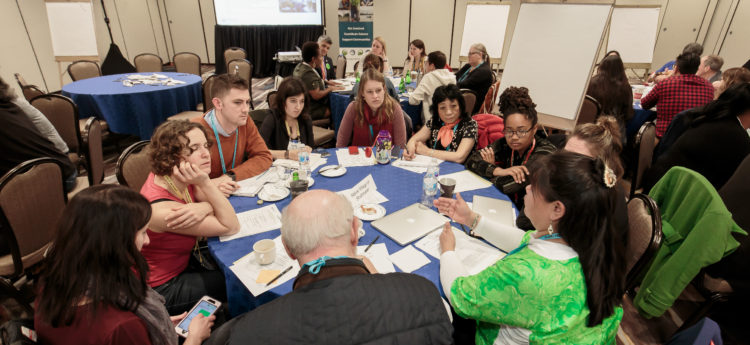Maddy Nyblade, a geoscientist studying at the University of Minnesota, has been a member of the Thriving Earth Community for several years, but her passion for community driven science has been a force in her career path for a long time. At AGU’s 2019 Fall Meeting, Maddy attended a Thriving Earth Exchange workshop as a friend of the program and added her voice and experience to the conversation to learn and improve the practice of community science. The Thriving Earth Exchange team is honored to share a guest post about her experience and path to finding a career in community science.
Finding My Place in the Community Science Movement
by Maddy Nyblade
This is my story of how I found community science and where it has taken me.
Science has always been the language of my relationship with this planet thanks to my geoscientist parents. Fossil hunting on roadsides, cracking open septarian nodules along streams, and many other hiking, skiing, and paddling adventures filled me with love and awe for this planet. But this passion was hard to fully carry with me into my undergraduate work. As a geoscience student at Penn State, I started to wonder if science was really as good for the world as it claimed to be. Is the love and care I feel for this planet and people reflected in mainstream academic science? Is science contributing to equity, justice, and sustainability, or is it perpetuating the deep systemic problems of our current society? The more I followed these questions down paths of environmental justice, community organizing, and history of the United States and Western science, the more lost I felt. My heart was torn between the way of knowing I was part of and the values I wanted to stand for.
When I found Thriving Earth Exchange at my first AGU conference in 2017, I was electrified by the possibility of a new model of science: a model that put communities and relationships first and science second, valued other ways of knowing equal to Western science, and worked for equity and justice. Never before had I heard scientists share and practice these priorities. While I still didn’t have a clear career path (and probably never will), I found a community of support and inspiration. I had people to point to and say, “that is the kind of scientist I want to be.” I had a vision and the courage to hold onto it.
Initially, this courage took me away from the academy to outdoor education where I could share and explore interconnections between the environment, science, and humanity. After growing confidence, creativity, and facilitation skills as an educator, my path changed again at an AGU e-lightening session on interdisciplinary science. When I heard Dr. Crystal Ng share her interdisciplinary hydrology research directed by Tribes in the Great Lakes Region focused on protecting manoomin (Ojibwe for wild rice), I was captivated. Through her story, she expressed the importance, challenge, and success of putting relationships first, within the process and above the expectations of academic science. My heart raced: a hydrologist who put people first?! This was the kind of project that would help me grow into the scientist I aspired to be. After the discussion, I followed up with Crystal and then applied for a graduate student position four days later, just before the application deadline. After almost a year as a graduate student on this project, I have learned that other members of our team have also been influenced and supported by the vision of the Thriving Earth Exchange.
While my work at this institution has been all-consuming (as engaging relationship-driven work tends to be!), leaving no time to volunteer with the Thriving Earth Exchange program, the team at AGU allowed me to participate in a second Community Fellows Training last December as a community science enthusiast. The workshop brought together an amazing community of people to share the wisdom Thriving Earth Exchange has collectively accrued over their 100+ projects. Their knowledge was both affirming and instructive for anyone in this work. I gained practical skills and experience in facilitation between scientists and communities, as well as validation in the value of these interpersonal skills in science. I left with a courageous clarity in the importance of this work that I carry with me as I put these values into action through my graduate degree.
At a Thriving Earth Exchange happy hour during AGU’s 2019 Fall Meeting, Natasha, a Thriving Earth Exchange Senior Specialist, jokingly told me: “It just wouldn’t be AGU, if you didn’t attend all of our events, Maddy!” While AGU would definitely go on without my over-the-top enthusiasm for the work of this program, I would not have found my current career path without their leadership. I am grateful for all the Thriving Earth Exchange has taught me over the past few years. I know it is easy to criticize and find fault in the world–I often find myself trapped in endless existential critique to the point of paralyzing inaction. But the work of this organization has given me knowledge and strength to pursue the career and change I am after.
Kawe Gidaa-Naanaagadawendaamin Manoomin
first we should consider manoomin/psiŋ (wild rice)
https://manoominpsin-gc.dash.umn.edu/
This interdisciplinary, Tribal-University collaboration began in 2018 to study manoomin/psiη (Ojibwe/Dakota for wild rice) and prioritize Tribal views on the cultural significance, ecology, and policy of this plant. Multiple environmental stressors together pose a major threat to manoomin/psiη, a sacred plant for Native peoples throughout the Great Lakes region. Native people who have lived with manoomin/psiη for generations understand this intimately, but Tribal views, concerns, and Treaty rights have not been adequately incorporated into natural resources policies. We are working to protect Tribal resource sovereignty through a culturally responsible, whole-ecosystem approach to environmental stewardship.

